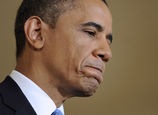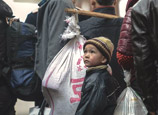
"Some populous provinces, such as Henan and Sichuan, welcome children of migrants with open arms. But Beijing, Shanghai and Guangzhou still offer no solution," she added.
People who are against allowing children of migrant workers to take the entrance exam with local children argue that it will cause more people to flood into the big cities, while metropolises such as Beijing and Shanghai are already overloaded and cannot handle more newcomers.
Sun Xiaobing, director of policy and regulation at the Ministry of Education, said on Jan 17 that Beijing's policy is a transitional one, and will improve step by step.
A 43-year-old father living in Shanghai, who gave his name only as Zhou for fear of reprisals from fellow residents, said he is far more anxious.
His 14-year-old son is in the eighth grade and will face the high school entrance exam in 2014.
"We're desperate. The new policy looks at parents' backgrounds, instead of children's ability. It is so unfair," said the native of Anhui province.
"We came to a better place, seeking a better life, but this migrant tag not only sticks with us, but also with our children.
"Children's education problems are a burden to our families," said the father.
"Sometimes we enjoy our family time, but once the idea of school problems pops up, the delightful atmosphere is gone without trace and we feel doomed."
China's hukou system, or household registration system, restricts children to attending schools in their home provinces. A regulation amended the restriction in 2003 by allowing children of migrants to receive nine-year compulsory education in cities where their parents work.
But under such policies, migrant children had to either return to their home provinces for further schooling or risk dropping out of school if they chose to stay with their parents in the cities where they work.
The policies have sparked mounting protests in recent years. As a consequence, the new gaokao rules were issued in 2012 as a major effort by the central government to provide equal rights in education and matriculation opportunities for those children, a group that is increasing due to the country's rapid urbanization.
Local requirements — loose or strict — mostly depend on a city's migrant population and the competitiveness of students, policy professor Li Chang'an said.


















 Beijing style: Duck, opera, fog and cough...
Beijing style: Duck, opera, fog and cough...


![]()
